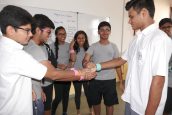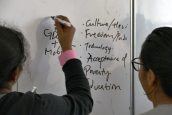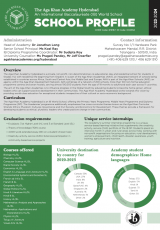A Journey into Leadership
 The Aga Khan Academies’ mission is centered on the core value of fostering home-grown intellectual and ethical leadership within our students. During the Aga Khan Academy, Hyderabad’s fifth working Saturday of the year on 21 November, our theme for the Middle Years Programme was ‘Leadership in India' – specifically, the re-emphasis of His Highness’s vision expressed during the 2006 Foundation Stone-Laying Ceremony for AKA, Hyderabad where he said, “The key to future progress in the developing world will be its ability to identify, to develop, and to retain expert and effective home-grown leadership.”
The Aga Khan Academies’ mission is centered on the core value of fostering home-grown intellectual and ethical leadership within our students. During the Aga Khan Academy, Hyderabad’s fifth working Saturday of the year on 21 November, our theme for the Middle Years Programme was ‘Leadership in India' – specifically, the re-emphasis of His Highness’s vision expressed during the 2006 Foundation Stone-Laying Ceremony for AKA, Hyderabad where he said, “The key to future progress in the developing world will be its ability to identify, to develop, and to retain expert and effective home-grown leadership.”
 Our goal is to develop these abilities within our students and inculcate the disposition of ethical leadership. Therefore, the structure and activities of Leadership Day was intended to take each student through the journey of laying a foundation for becoming home-grown leaders.
Our goal is to develop these abilities within our students and inculcate the disposition of ethical leadership. Therefore, the structure and activities of Leadership Day was intended to take each student through the journey of laying a foundation for becoming home-grown leaders.
 The students participated in a simulation where they were divided into citizens of two nations: Jah and Kay. Jah, a developing country of rich culture and history and a new sense of pride from their recent independence, was tasked to create a monument as a symbol of patriotism using their native materials. Kay, a powerful country in the modern world comfortable in wealth, technology and material resources, had citizens who wished to volunteer their expertise and resources for those in need in Jah. The gross disparity of these two nations was made more evident when the Kayns entered Jah. Their interaction, and the clash of protection against patronisation, shifted the temperature of the room. The result of their differing objectives varied from class to class – some group interactions showed Jahns helplessly subdued, leading to a civil collaboration of sorts, while others struggled to manage the imminent conflict arising from stereotypes, relentless defense and overwhelming emotion.
The students participated in a simulation where they were divided into citizens of two nations: Jah and Kay. Jah, a developing country of rich culture and history and a new sense of pride from their recent independence, was tasked to create a monument as a symbol of patriotism using their native materials. Kay, a powerful country in the modern world comfortable in wealth, technology and material resources, had citizens who wished to volunteer their expertise and resources for those in need in Jah. The gross disparity of these two nations was made more evident when the Kayns entered Jah. Their interaction, and the clash of protection against patronisation, shifted the temperature of the room. The result of their differing objectives varied from class to class – some group interactions showed Jahns helplessly subdued, leading to a civil collaboration of sorts, while others struggled to manage the imminent conflict arising from stereotypes, relentless defense and overwhelming emotion.
 During the critical debriefing stage, students understood that cultural and contextual understanding is crucial in leading change within one’s community. They recognised the power of leaders within their own surroundings and were able to apply these understandings in the real world, specifically to their own actions and realities. During their reflection, students analysed why home-grown leadership, namely their own potential for leadership, is essential in achieving progress in India.
During the critical debriefing stage, students understood that cultural and contextual understanding is crucial in leading change within one’s community. They recognised the power of leaders within their own surroundings and were able to apply these understandings in the real world, specifically to their own actions and realities. During their reflection, students analysed why home-grown leadership, namely their own potential for leadership, is essential in achieving progress in India.
In order to see what home-grown leadership can look like in their own cultural context, we invited three members of the Hyderabad community to share their stories with the students. As leaders in their own right, these speakers demonstrated through their personal and professional experience how their organisations and country are benefiting from the leadership of Indians.
 Design professional and social-eco entrepreneur Aditi Shah Aman, social worker and entrepreneur Neha Swain, and environment and waste management professional Sandipan Sarangi were dynamic speakers and represented the diversity in opportunities for leadership in action. In direct relation with their unit on Social Entrepreneurship in the Leadership Curriculum, the year 10 students learned about Aditi’s journey as co-founder of Rare Earth Design, an enterprise which designs and markets eco-friendly artisan products. As co-founder of Rubaroo, an organization promoting societal youth development and learning, Neha strives to build the life skills and leadership capacity within the youth of India through experiential learning activities, such as workshops and camps. Sandipan, an assistant manager at NASSCOM Foundation, is determined to be part of the positive change in India through waste and environmental management, particularly on how technology is used to develop viable models for poverty alleviation and sustainable development. He surprised and captured his audience of year 7 and 8 students with his raw and relatable experiences as a young Indian on an unconventional mission. He challenged the students to put him out of a job by being environmentally aware and managing their waste in a more sustainable manner.
Design professional and social-eco entrepreneur Aditi Shah Aman, social worker and entrepreneur Neha Swain, and environment and waste management professional Sandipan Sarangi were dynamic speakers and represented the diversity in opportunities for leadership in action. In direct relation with their unit on Social Entrepreneurship in the Leadership Curriculum, the year 10 students learned about Aditi’s journey as co-founder of Rare Earth Design, an enterprise which designs and markets eco-friendly artisan products. As co-founder of Rubaroo, an organization promoting societal youth development and learning, Neha strives to build the life skills and leadership capacity within the youth of India through experiential learning activities, such as workshops and camps. Sandipan, an assistant manager at NASSCOM Foundation, is determined to be part of the positive change in India through waste and environmental management, particularly on how technology is used to develop viable models for poverty alleviation and sustainable development. He surprised and captured his audience of year 7 and 8 students with his raw and relatable experiences as a young Indian on an unconventional mission. He challenged the students to put him out of a job by being environmentally aware and managing their waste in a more sustainable manner.
 The essence of home-grown leadership was captured through experiential learning. Throughout the day-long journey, students gained an understanding of what home-grown leadership is, why it is important to us as members of the Academies community, who these leaders are, and where this type of leadership can be found in their context.
The essence of home-grown leadership was captured through experiential learning. Throughout the day-long journey, students gained an understanding of what home-grown leadership is, why it is important to us as members of the Academies community, who these leaders are, and where this type of leadership can be found in their context.
When leadership translates into action is dependent on the individual. Therefore, our last segment of Leadership Day allowed students reflection time to create an action plan on how they hope to make a difference as leaders within their school community in the short term and in the broader community context in the future.
Click here to read a student reflection about Leadership Day
By Zohra Lakhani, Student Leadership Programmes Manager





